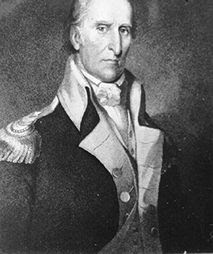Hello again. I try to take breaks, really, but then when I return to the research I get excited again. To be an artist is to doubt one's self, indeed, but to embrace your gifts is an indescribable bliss. I only wish that everyone could work from their heart, out of goodness of course.
I read a more indepth description of the story behind
The Patriot, and in lieu of how completely whacked out Mel Gibson is right now, I would choose to bring attention to the distinguished patriots whose stories emboldened screenwriters to memorialize them into one man: fictional Benjamin Martin. Mr. Gibson, please get some help, and have some shame.
Our patriots, to commense this series, are Captain Daniel Morgan, Brigadier General Francis Marion, Colonel Elijah Clark, General Thomas Sumter, and Brigadier General Andrew Pickens. It would not suprise me to find that I am in some way related to each of these men. Look out, DAR, I've got another whammy for you.
Slap him a little bit harder, Senator Kerry, he's about to make a huge mistake.
Former Senator John Edwards, the former trial lawyer and seemingly happily married man, is the 7th great grandson of a great patriot of this country: Brigadier General Andrew Pickens (1739-1817). Who? Yes, to the point he's not exactly a well-known fellow, but he did some fine things in his day. And I think he didn't start rolling over in his grave when John Edwards cheated on his wife and used his constituents money to do it, no, no. I think Andrew Pickens began rattling his bones at the words "trial lawyer."
Perhaps someone else in the family could do his memory justice.
"The Fighting Elder"
Andrew Pickens's beginnings were very much like that of Francis Marion: his ancestors were persecuted Presbyterians who eventually left England for the New World. Pickens's parents, surname originally Picon (French), were Ulster people who immigrated from Northern Ireland. They settled in the Pennsylvania back country as indentured servants, where Andrew Pickens Jr. (our hero) was born in 1739. The Pickenses migrated South in 1754, in classic Scots-Irish fashion, following their release from service and undoubtedly some hostile encounters with Native Americans. They were strict in their faith, so much so that Pickens was given the nickname the "Fighting Elder."
His parents remained in Waxhaw, which today is a suburb of Charlotte, but Andrew Jr. sold his property in 1764 following the final treaty of the French and Indian War, and pushed further south to Abbeville. Remember Abbeville? It's all coming together. Andrew Jr. married Rebecca Calhoun, of the same French descent as Andrew's great grandparents, in Abbeville. They may have been on the same boat as the Marions: they were also from La Rochelle. Pickens built Hopewell Plantation on the Savannah River, where many a Cherokee treaty was signed. Andrew and Rebecca had 14 children: Andrew III would follow in his father's political footsteps, and his brother Floride would father the politician John C.Calhoun. But my heart belongs to his eldest child, a girl named Mary. Mary is my great grandmother. That's right: this time draw a straight line connecting me to a famous revolutionary.

Andrew fought in the Cherokee Campaign, and may very well have known Francis Marion by name, if not by reputation. Where Marion rose from nothing to Lietenant, Pickens began as Captain and became a Brigadier General. His relocation following the war to the Georgia border brought him into the Revolutionary War battles in Georgia, where my mom's relative Randal Ramsay fought in the Continental Army. Remember how Francis Marion fled Charleston before it was seized by the British in 1780? Andrew Pickens was taken prisonner. So what did this guy do to put his name on that list? He led a 300 man militia against the Tories, who had shown up in Georgia to gather support for the British. They didn't like him so much. Sounds like my kinda guy. He was put under parole, and his men the same, swearing under oath that they would sit out the war. But the Tories ransacked his home and spooked his children. I hate to repeat myself, but don't mess with a bull, you might get the horns.

Pickens was also a guerilla fighter, and a brave soldier. He'd traded with the Indians, and learned how to fight like them during the Cherokee Campaign. His strategies in warfare helped to win the battles of Cowpens, Ninety-Six, Augusta, and Eutaw. Eutaw was in Francis Marion's backyard, and they both took orders from Nathaniel Greene.
Andrew Pickens served as a congressman following the Revolutionary War, worked on relations with the Cherokee Nation, and later sympathized with the Cherokee when they were driven from their land to Oklahoma. The Cherokee named him "Wizard Owl" for his wise diplomacy. He is buried at Old Stone Church in Clemson.
Ok, can I talk about his nose? What is going on with the long French noses? I wonder if the other 3 patriots had honkers like Pickens and Marion. I've got French eyes and a French nose, and a [distant, thank God] cousin named John Edwards.

















































